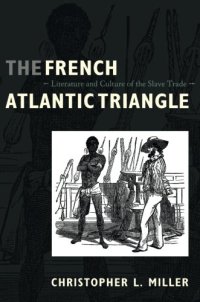
Ebook: The French Atlantic Triangle: Literature and Culture of the Slave Trade
Author: Christopher L. Miller
- Tags: French, European, Regional & Cultural, History & Criticism, Literature & Fiction, Social Sciences, Children’s Studies, Communication & Media Studies, Criminology, Customs & Traditions, Demography, Disaster Relief, Emigration & Immigration, Folklore & Mythology, Gender Studies, Gerontology, Holidays, Human Geography, Human Sexuality, Library & Information Science, Linguistics, Methodology, Museum Studies & Museology, Philanthropy & Charity, Popular Culture, Pornography, Poverty, Privacy & Surveillance, Reference, Research
- Year: 2008
- Publisher: Duke University Press Books
- Language: English
- pdf
Miller offers a historical introduction to the cultural and economic dynamics of the French slave trade, and he shows how Enlightenment thinkers such as Montesquieu and Voltaire mused about the enslavement of Africans, while Rousseau ignored it. He follows the twists and turns of attitude regarding the slave trade through the works of late-eighteenth- and early-nineteenth-century French writers, including Olympe de Gouges, Madame de Staël, Madame de Duras, Prosper Mérimée, and Eugène Sue. For these authors, the slave trade was variously an object of sentiment, a moral conundrum, or an entertaining high-seas “adventure.” Turning to twentieth-century literature and film, Miller describes how artists from Africa and the Caribbean—including the writers Aimé Césaire, Maryse Condé, and Edouard Glissant, and the filmmakers Ousmane Sembene, Guy Deslauriers, and Roger Gnoan M’Bala—have confronted the aftermath of France’s slave trade, attempting to bridge the gaps between silence and disclosure, forgetfulness and memory.